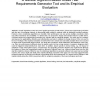Free Online Productivity Tools
i2Speak
i2Symbol
i2OCR
iTex2Img
iWeb2Print
iWeb2Shot
i2Type
iPdf2Split
iPdf2Merge
i2Bopomofo
i2Arabic
i2Style
i2Image
i2PDF
iLatex2Rtf
Sci2ools
TSE
2010
2010
A Genetic Algorithm-Based Stress Test Requirements Generator Tool and Its Empirical Evaluation
Genetic algorithms (GAs) have been applied previously to UML-driven, stress test requirements generation with the aim of increasing chances of discovering faults relating to network traffic in distributed real-time systems. However, since evolutionary algorithms are heuristic, their performance can vary across multiple executions, which may affect robustness and scalability. To address this, we present the design and technical detail of a UML-driven, GA-based stress test requirements generation tool, together with its empirical analysis. The main goal is to analyze and improve the applicability, efficiency and effectiveness and also to validate the design choices of the GA used in the tool. Findings of the empirical evaluation reveal that the tool is robust and reasonably scalable when it is executed on large-scale experimental design models. The study also reveals the main bottlenecks and limitations of the tools, e.g., there is a performance bottleneck when the system under test has ...
| Added | 22 May 2011 |
| Updated | 22 May 2011 |
| Type | Journal |
| Year | 2010 |
| Where | TSE |
| Authors | Vahid Garousi |
Comments (0)

